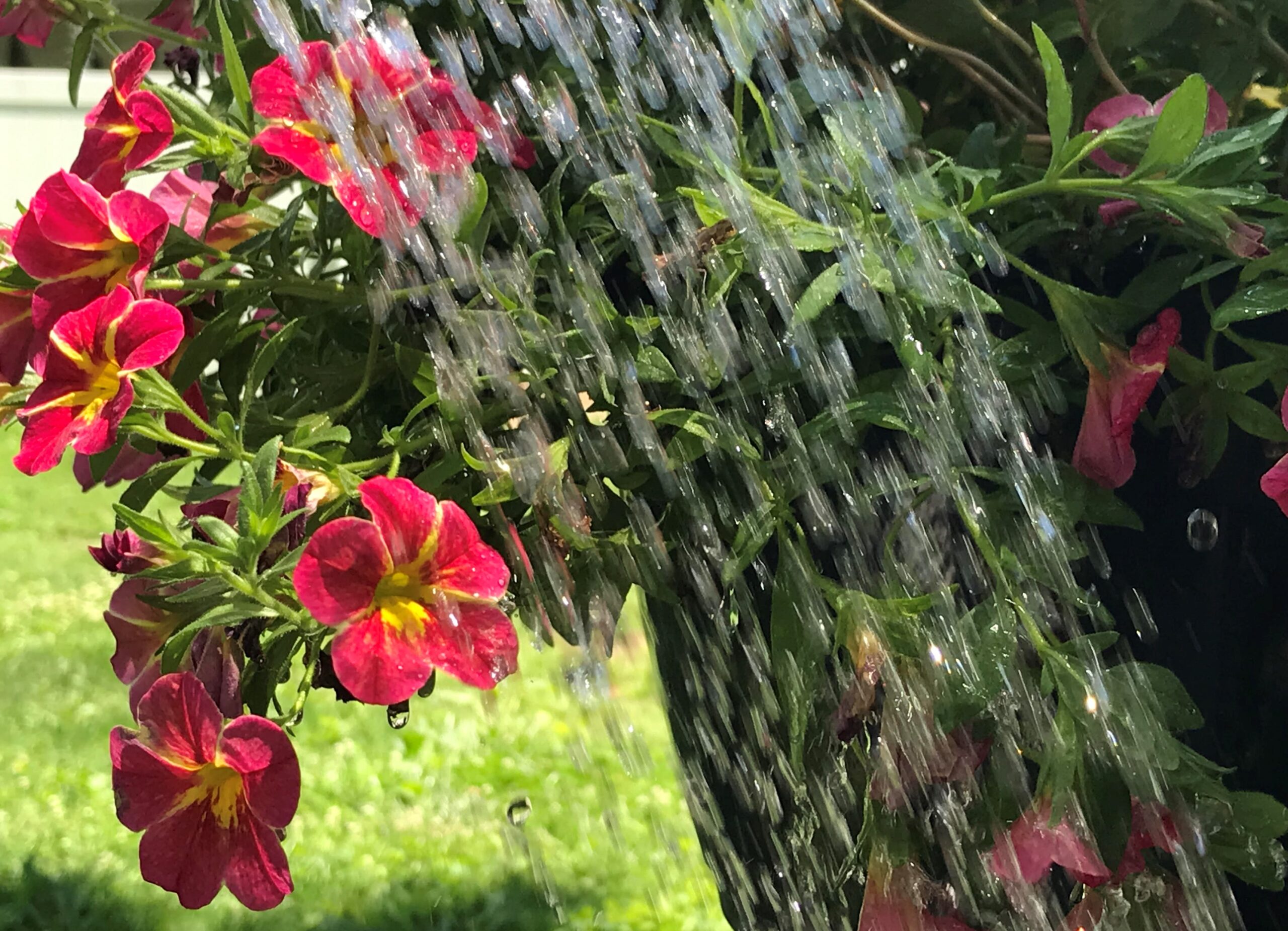
The metal bench is branding the underside of my thighs—I can almost hear the sizzle—and the dog is pacing, lifting each paw the second he sets it down. Necessity has forced my husband into Walmart, an experience he assiduously avoids, and we are waiting for him outside in the heat of the day, wondering why no one plants shade trees to cool these hellish excursions. Okay, you would lose a few parking spaces, but it would civilize all this hardscape, make it more inviting. . . .
My silent rant breaks off when I hear rain, lovely relief. I stretch out my forearm but feel no drops. Puzzled, I turn and see a young man with a hose and wand, watering the big rack of hanging baskets just behind us. As I watch the arc of sparkling droplets, something in me eases. Just the sound of that falling water softens the sun’s glare. Water pools inside the baskets and splashes onto the hot concrete, and I can sense the parched plants sucking up refreshment.
The dog watches with the single-minded hope that drives a broke man to any ceremony with an open bar. Alas, no drink is offered. We both continue to stare nonetheless, hypnotized by the wand’s methodical journey from basket to basket. By the time the young man leaves, the flowers are taller, perkier, bright with droplets, restored to a state of sufficiency.
Why is it so hard for us to give every living thing what it needs in abundance?
For years, pediatricians urged parents to withhold attention and comfort from a sobbing infant. Bosses are so afraid of familiarity that they shy away from friendship with their “subordinates”—and lose the chance for real, mutual support and collaboration. Dog trainers tell you to insist on a heel and allow no sniffing, even though you want your dog to be sharp and alert and savvy, and a deep, languorous sniff is the way he learns the world.
For all our abundance, our supersizing and vast spaces and colossal waste, we live in a culture of denial. I roll my eyes when a needy friend angles for attention, finding his boyish obviousness less than charming. Why not give him a little extra reassurance instead, would it kill me? When was the last time a doctor let you talk through everything you were experiencing, physically and emotionally? When was the last time you felt you had enough time to do everything expected of you well and thoroughly?
Nearly always, the stingy withholding of what another creature needs is our attempt to keep power over them. Or over ourselves, because we rarely give ourselves enough of what we need, either. Who sleeps until they are rested? Eats whenever they are hungry? Stops to relax when the stress ratchets too high? Plays with abandon?
The begonias and fuchsia and friendly wave petunias hanging behind me do not share our dilemma. If they are denied what they need, they simply wilt and die, nothing passive-aggressive about it. We, on the other hand, can wilt and hide it; we can find all sorts of twisted ways to stay alive without getting what we need to flourish.
What happens, though, is that we become stingy ourselves, rationing our love because we never had the chance to store up enough for ourselves. I was lucky on that score; my mother gave in abundance. What I never have enough of is time, and so I swat away fun and grit my teeth at requests that would otherwise be a joy to fulfill.
Human beings do not do well with scarcity. Abundance makes us calm, generous, warm, expansive, but the notion that there will not be enough pulls the ground out from under us. What does this instinctive fear look like now, when we are fast using up our planet’s resources, the era of abundant jobs with decent pay is over, and we are worried about food scarcity and water shortages and energy depletion and a run on microchips? Remember how we freaked out just at the temporary COVID shortages, running around like chickens trying to find toilet tissue or flour or hand sanitizer? Imagine the panic that awaits us.
This country was teeming with forests, clean lakes, and wildlife when the Europeans arrived, and that abundance captured their imagination. That fast, we became the Promised Land, the place where anyone could make their fortune, the nation with its arms spread wide to welcome anyone in need.
Now we begrudge refugees who have been raped, imprisoned, threatened, or tortured a cot with clean sheets and a chance to find work. Why? Because we are afraid there will not be enough for us. Fear has turned various groups against one another, left us grasping for our share of what used to be plenty.
We based a nation on a mythic promise, and then our greedy ambition destroyed the real abundance that gave rise to that myth. Now we are all as dry as dust, waiting in the midday sun for the generous care we never learned to give.
Read more by Jeannette Cooperman here.
